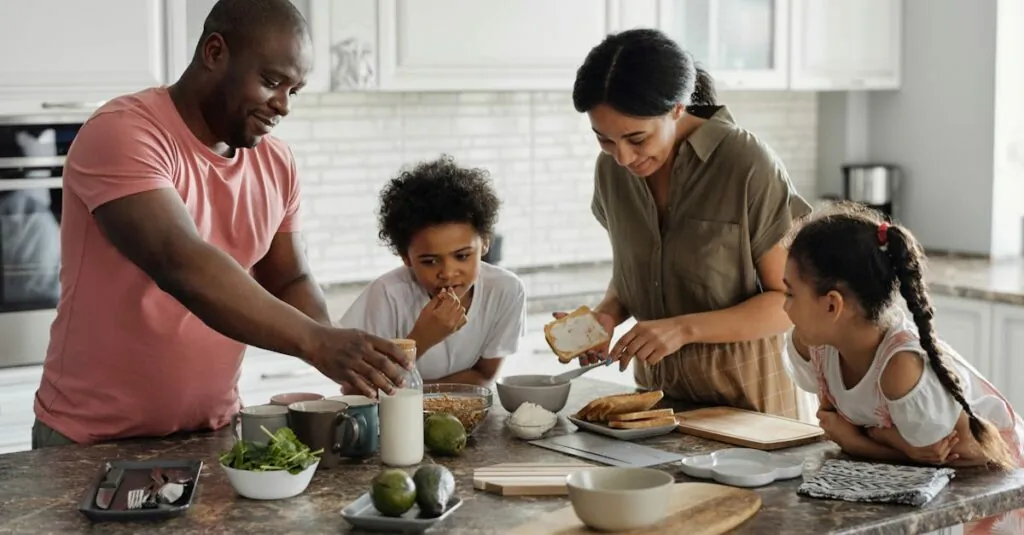Table of Contents
ToggleCooking with children isn’t just about whipping up a meal; it’s a delightful recipe for bonding, learning, and a sprinkle of chaos. Imagine the laughter as flour clouds fill the kitchen and the occasional egg lands on the floor instead of the bowl. It’s not just messy fun; it’s a chance to teach kids valuable life skills while creating delicious memories.
When kids step into the kitchen, they’re not just learning to sauté or bake—they’re discovering math, science, and even a bit of patience (a rare gem for any parent). From measuring ingredients to understanding the magic of heat, cooking transforms the kitchen into a mini classroom. So grab that apron and prepare for culinary adventures that’ll leave both parents and kids grinning from ear to ear. After all, what’s better than a home-cooked meal made with love and a dash of laughter?
Benefits of Cooking With Children
Cooking with children fosters strong family bonds. Engaging in meal preparation allows for shared experiences, creating lasting memories. Kids learn practical skills while participating in tasks like chopping vegetables or measuring ingredients. Opportunities arise for teaching basic math concepts, such as fractions and counting.
Cognitive development thrives in a kitchen setting. Cooking enhances problem-solving skills through recipe navigation and ingredient substitutions. Kids build their vocabulary by learning about tools and terms specific to cooking. Understanding where food comes from cultivates an appreciation for healthy eating.
Creativity flourishes in culinary activities. Children express themselves through new flavor combinations or unique presentation styles. They develop a sense of ownership and pride in preparing meals. Trying out new recipes together encourages adventurous eating habits.
Social skills improve during collaborative cooking. Kids practice patience, communication, and teamwork while working harmoniously with others. Diversity in cuisines introduces children to new cultures and traditions through shared meals. Cooking together cultivates gratitude for family time and the effort behind meals.
Healthier eating habits emerge from kitchen involvement. Children take an active role in meal choices, leading to informed decisions about nutrition. Understanding food preparation can reduce picky eating behaviors. Exposure to various ingredients promotes a willingness to try healthy foods.
Cooking provides a unique platform for promoting responsibility. Kids learn the importance of cleanliness, safety, and organization in the kitchen. Following recipes teaches discipline and focus, which can translate into other life areas. Time spent cooking equips children with essential life skills they carry into adulthood.
Skills Development
Cooking with children nurtures critical skills essential for their growth. Engaging in the kitchen provides numerous opportunities for development in both cognitive and motor skills.
Cognitive Skills
Cooking enhances cognitive abilities as children follow recipes, measure ingredients, and grasp new cooking terminology. Understanding measurements fosters early math knowledge, while reading recipe steps improves literacy skills. Problem-solving comes into play when they encounter challenges, such as adjusting recipes or determining cooking times. Children learn to make decisions about flavors and ingredients, stimulating their creativity. Such experiences build confidence in their analytical thinking while making the process enjoyable.
Motor Skills
Cooking contributes significantly to developing fine motor skills through various activities. Chopping vegetables requires coordination and control, while whisking eggs involves wrist strength. Stirring and pouring enhance hand-eye coordination, which is vital for many daily tasks. Children practice using utensils effectively, promoting dexterity. Kneading dough and rolling out pastry strengthens their grip and muscle memory. Each of these activities supports their physical agility and boosts their overall confidence in handling tools and food safely.
Emotional Growth
Cooking with children offers significant emotional benefits that contribute to their development. Engaging in culinary activities builds a child’s self-esteem and emotional resilience.
Building Confidence
Involvement in cooking allows children to see their capabilities in action. They gain confidence as they learn to follow recipes and create dishes independently. Success in the kitchen results in a sense of accomplishment, reinforcing their belief in their own skills. Examples like chopping vegetables or mixing batter acquire mastery through repetition and practice. Each successful meal prepared boosts their confidence further, creating a positive feedback loop. Children also take pride in contributing to family meals, enhancing their self-worth and sense of belonging.
Fostering Independence
Cooking nurtures independence in children by encouraging them to take charge of tasks. As they learn to handle various ingredients and kitchen tools, they become more self-reliant. Completing tasks such as measuring ingredients or setting the table promotes autonomy. Through cooking, children learn to make decisions, like choosing flavors or adjusting recipes. Mistakes in the kitchen serve as valuable learning experiences, encouraging resilience and adaptability. This process of taking responsibility fosters a strong sense of independence that extends beyond the kitchen into daily life.
Social Interaction
Cooking together offers an ideal platform for social interaction among children and parents. Engaging in joint culinary activities strengthens family relationships and fosters communication.
Family Bonding
Building strong family bonds occurs naturally in the kitchen. Through shared experiences, families create lasting memories as they cook together. Tasks like preparing ingredients and setting the table spark conversations, allowing family members to connect. Cooking also promotes teamwork among siblings, encouraging collaboration toward a common goal. Jointly tackling a recipe not only cultivates communication but also opens avenues for expressing ideas and opinions, enriching family dynamics.
Teamwork and Cooperation
Successful cooking requires teamwork and cooperation. Children learn to work together when following a recipe, reinforcing patience as they wait for one another to complete tasks. They understand their roles and responsibilities in the kitchen through collaborative efforts. Sharing tasks like stirring, chopping, or mixing leads to a sense of achievement as children witness the final product. This experience emphasizes the importance of cooperating to achieve shared objectives, nurturing social skills foundational for future interactions. Collaboration in cooking fosters inclusivity and respect among family members, enhancing their interpersonal relationships.
Health Benefits
Cooking with children offers numerous health advantages, especially in developing nutritional awareness and fostering healthy habits.
Nutritional Awareness
Engaging children in cooking helps them understand nutrition. They learn about food groups, vitamins, and minerals present in various ingredients. Knowledge gained from cooking encourages them to make healthier choices. Familiarity with fresh fruits, vegetables, and whole grains often replaces reliance on processed foods. As they prepare meals, they discover the importance of balanced diets and portion sizes. This direct experience enhances their ability to identify nutritious food options later in life. Cooking together also opens discussions about meal preparation and healthy eating patterns, reinforcing what they learn in school.
Healthy Habits
Instilling healthy habits begins in the kitchen. Children develop an appreciation for preparing meals from scratch, reducing the temptation to opt for fast food. Engaging in regular cooking activities encourages routine and structure. They learn to plan meals and understand the time it takes to prepare food, cultivating patience. Meal preparation often becomes a family tradition, reinforcing the value of home-cooked food. Involvement in cooking fosters a sense of responsibility and ownership over their health. Ultimately, these skills grow into lifelong habits that promote overall wellness and prevent unhealthy eating behaviors.
Cooking with children is more than just a fun activity; it’s a pathway to growth and connection. Engaging in the kitchen nurtures essential life skills while fostering creativity and independence. As children learn to navigate recipes and work alongside family members, they develop confidence and improved social skills.
The experience creates cherished memories that strengthen family bonds and encourage open communication. By introducing children to healthy cooking practices, parents instill lifelong habits that promote wellness. Ultimately, the kitchen becomes a space not just for meal preparation but for learning, laughter, and love, enriching both childhood and family life.







